高中宾语从句详解
高中宾语从句讲解
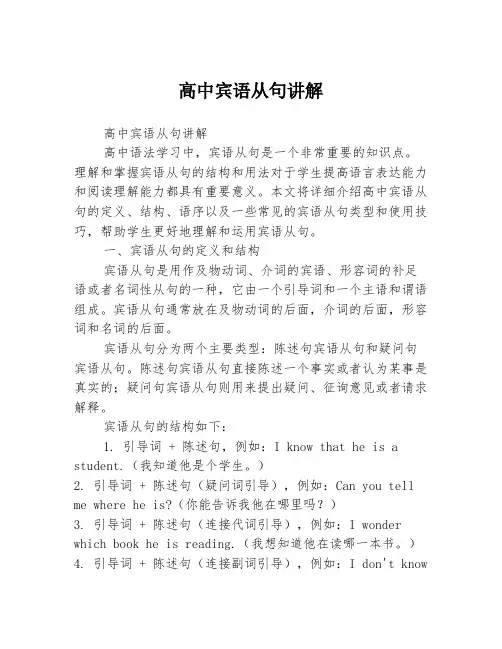
高中宾语从句讲解高中宾语从句讲解高中语法学习中,宾语从句是一个非常重要的知识点。
理解和掌握宾语从句的结构和用法对于学生提高语言表达能力和阅读理解能力都具有重要意义。
本文将详细介绍高中宾语从句的定义、结构、语序以及一些常见的宾语从句类型和使用技巧,帮助学生更好地理解和运用宾语从句。
一、宾语从句的定义和结构宾语从句是用作及物动词、介词的宾语、形容词的补足语或者名词性从句的一种,它由一个引导词和一个主语和谓语组成。
宾语从句通常放在及物动词的后面,介词的后面,形容词和名词的后面。
宾语从句分为两个主要类型:陈述句宾语从句和疑问句宾语从句。
陈述句宾语从句直接陈述一个事实或者认为某事是真实的;疑问句宾语从句则用来提出疑问、征询意见或者请求解释。
宾语从句的结构如下:1. 引导词 + 陈述句,例如:I know that he is a student.(我知道他是个学生。
)2. 引导词 + 陈述句(疑问词引导),例如:Can you tell me where he is?(你能告诉我他在哪里吗?)3. 引导词 + 陈述句(连接代词引导),例如:I wonder which book he is reading.(我想知道他在读哪一本书。
)4. 引导词 + 陈述句(连接副词引导),例如:I don't knowwhen he will come back.(我不知道他什么时候回来。
)二、宾语从句的语序和时态1. 宾语从句中的语序:宾语从句的语序与陈述句相同,即主语在前,谓语在后。
例如:I know that he is a student.(我知道他是个学生。
)2. 宾语从句中的时态:宾语从句的时态与引导宾语从句的动词的时态有关。
如果引导宾语从句的主句动词是现在时态,那么宾语从句的时态可根据需要使用各种时态。
例如:I hope you will come to my birthday party.(我希望你能来参加我的生日聚会。
高中英语宾语从句知识点总结
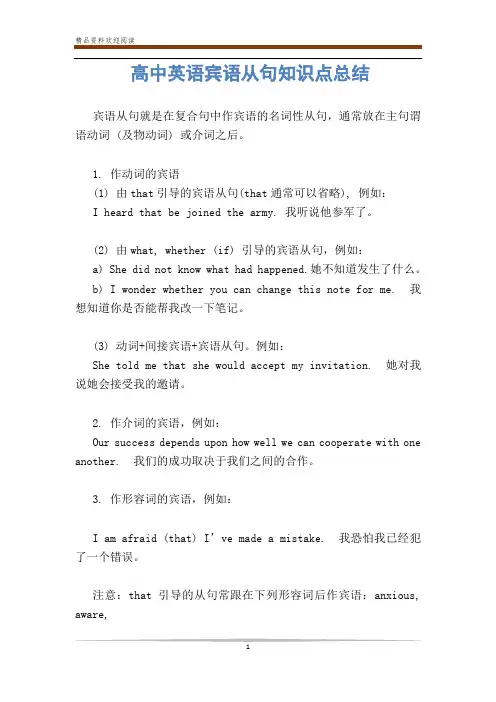
高中英语宾语从句知识点总结宾语从句就是在复合句中作宾语的名词性从句,通常放在主句谓语动词 (及物动词) 或介词之后。
1. 作动词的宾语(1) 由that引导的宾语从句(that通常可以省略), 例如:I heard that be joined the army. 我听说他参军了。
(2) 由what, whether (if) 引导的宾语从句,例如:a) She did not know what had happened.她不知道发生了什么。
b) I wonder whether you can change this note for me. 我想知道你是否能帮我改一下笔记。
(3) 动词+间接宾语+宾语从句。
例如:She told me that she would accept my invitation. 她对我说她会接受我的邀请。
2. 作介词的宾语,例如:Our success depends upon how well we can cooperate with one another. 我们的成功取决于我们之间的合作。
3. 作形容词的宾语,例如:I am afraid (that) I’ve made a mistake.我恐怕我已经犯了一个错误。
注意:that 引导的从句常跟在下列形容词后作宾语:anxious, aware,certain, confident, convinced, determined, glad, proud, surprised, worried,sorry, thankful, ashamed, disappointed, annoyed, pleased, hurt, satisfied,content 等。
也可以将此类词后的that 从句的看作原因状语从句。
4. it 可以作为形式宾语it 不仅可以作为形式主语,还可以作为形式宾语而真正的宾语that 从句则放在句尾,特别是在带复合宾语的句子中。
高一宾语从句知识点
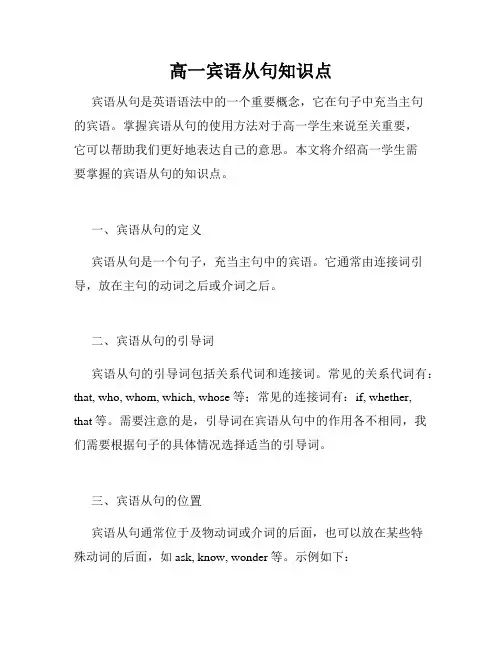
高一宾语从句知识点宾语从句是英语语法中的一个重要概念,它在句子中充当主句的宾语。
掌握宾语从句的使用方法对于高一学生来说至关重要,它可以帮助我们更好地表达自己的意思。
本文将介绍高一学生需要掌握的宾语从句的知识点。
一、宾语从句的定义宾语从句是一个句子,充当主句中的宾语。
它通常由连接词引导,放在主句的动词之后或介词之后。
二、宾语从句的引导词宾语从句的引导词包括关系代词和连接词。
常见的关系代词有:that, who, whom, which, whose等;常见的连接词有:if, whether, that等。
需要注意的是,引导词在宾语从句中的作用各不相同,我们需要根据句子的具体情况选择适当的引导词。
三、宾语从句的位置宾语从句通常位于及物动词或介词的后面,也可以放在某些特殊动词的后面,如ask, know, wonder等。
示例如下:1. I know that he is a teacher.2. Can you tell me where the library is?3. She asked if I had finished my homework.四、宾语从句的时态和语序宾语从句的时态和语序需要遵循一定的规则。
一般来说,当主句是现在时或将来时时,宾语从句可以保持原来的时态;当主句是过去时时,宾语从句需要根据实际情况进行相应的时态转换。
此外,宾语从句的语序和陈述句的语序相同。
示例如下:1. He said that he is a doctor. (主句是现在时)2. She asked if we will go to the party. (主句是将来时)3. They wondered where she had gone. (主句是过去时)五、宾语从句的语气宾语从句的语气分为陈述语气、疑问语气和祈使语气。
根据主句的语气,我们可以决定宾语从句的语气。
如果主句是陈述句,宾语从句就保持陈述语气;如果主句是疑问句,宾语从句就保持疑问语气;如果主句是祈使句,宾语从句就保持祈使语气。
英语高考宾语从句考点解析
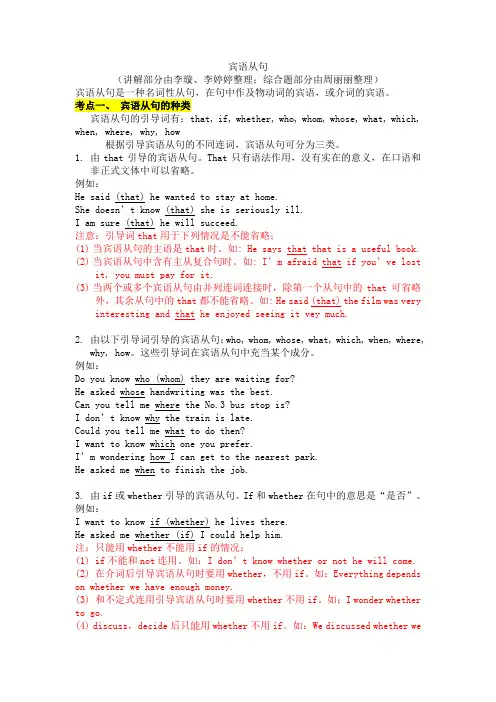
宾语从句(讲解部分由李璇、李婷婷整理;综合题部分由周丽丽整理)宾语从句是一种名词性从句,在句中作及物动词的宾语,或介词的宾语。
考点一、宾语从句的种类宾语从句的引导词有:that, if, whether, who, whom, whose, what, which, when, where, why, how根据引导宾语从句的不同连词,宾语从句可分为三类。
1.由that引导的宾语从句。
That只有语法作用,没有实在的意义,在口语和非正式文体中可以省略。
例如:He said (that) he wanted to stay at home.She doesn’t know (that) she is seriously ill.I am sure (that) he will succeed.注意:引导词that用于下列情况是不能省略;(1)当宾语从句的主语是that时。
如: He says that that is a useful book.(2)当宾语从句中含有主从复合句时。
如: I’m afraid that if you’ve lostit, you must pay for it.(3)当两个或多个宾语从句由并列连词连接时,除第一个从句中的that可省略外,其余从句中的that都不能省略。
如: He said (that) the film was very interesting and that he enjoyed seeing it vey much.2.由以下引导词引导的宾语从句:who, whom, whose, what, which, when, where,why, how。
这些引导词在宾语从句中充当某个成分。
例如:Do you know who (whom) they are waiting for?He asked whose handwriting was the best.Can you tell me where the No.3 bus stop is?I don’t know why the train is late.Could you tell me what to do then?I want to know which one you prefer.I’m wondering how I can get to the nearest park.He asked me when to finish the job.3.由if或whether引导的宾语从句。
高中宾语从句讲解
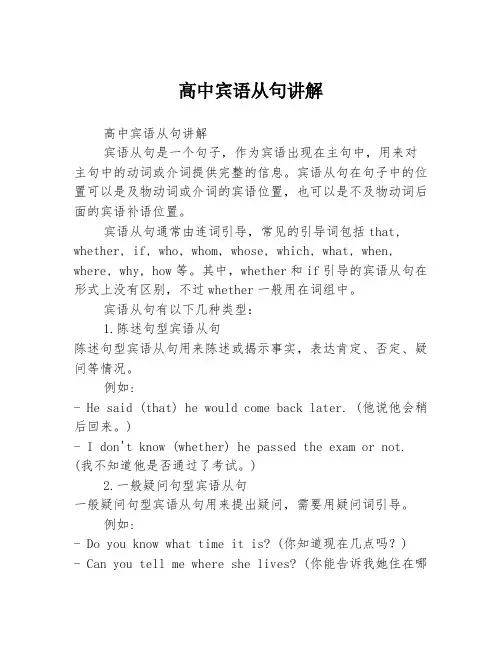
高中宾语从句讲解高中宾语从句讲解宾语从句是一个句子,作为宾语出现在主句中,用来对主句中的动词或介词提供完整的信息。
宾语从句在句子中的位置可以是及物动词或介词的宾语位置,也可以是不及物动词后面的宾语补语位置。
宾语从句通常由连词引导,常见的引导词包括that, whether, if, who, whom, whose, which, what, when, where, why, how等。
其中,whether和if引导的宾语从句在形式上没有区别,不过whether一般用在词组中。
宾语从句有以下几种类型:1.陈述句型宾语从句陈述句型宾语从句用来陈述或揭示事实,表达肯定、否定、疑问等情况。
例如:- He said (that) he would come back later. (他说他会稍后回来。
)- I don't know (whether) he passed the exam or not. (我不知道他是否通过了考试。
)2.一般疑问句型宾语从句一般疑问句型宾语从句用来提出疑问,需要用疑问词引导。
例如:- Do you know what time it is? (你知道现在几点吗?) - Can you tell me where she lives? (你能告诉我她住在哪里吗?)3.特殊疑问句型宾语从句特殊疑问句型宾语从句也用来提出疑问,但是疑问词有限定的范围。
例如:- I wonder who invited them to the party. (我想知道是谁邀请他们参加聚会的。
)- Could you please tell me how many students are in the class? (请你告诉我班上有多少学生好吗?)4.感叹句型宾语从句感叹句型宾语从句用来表达惊讶、钦佩、赞叹等情感。
例如:- I can't believe what I just saw! (我简直无法相信刚才看到的!)- It's amazing how fast she can run! (她跑得如此之快,太令人惊讶了!)需要注意的是,宾语从句的时态和语序要根据主句的要求进行调整。
高中宾语从句讲解
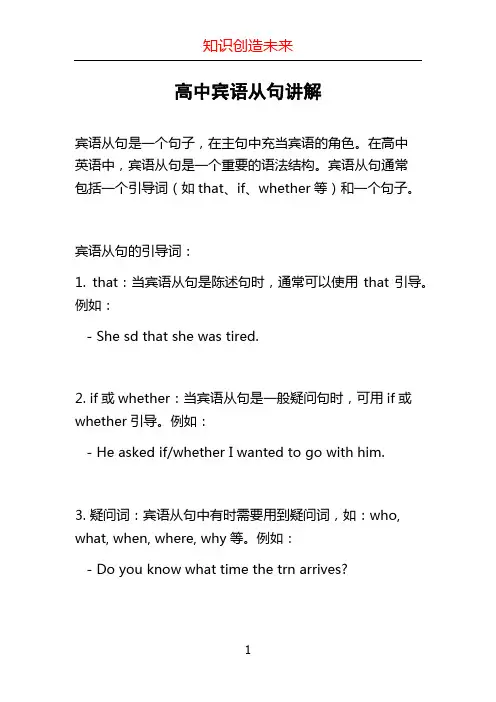
高中宾语从句讲解宾语从句是一个句子,在主句中充当宾语的角色。
在高中英语中,宾语从句是一个重要的语法结构。
宾语从句通常包括一个引导词(如that、if、whether等)和一个句子。
宾语从句的引导词:1. that:当宾语从句是陈述句时,通常可以使用that引导。
例如:- She sd that she was tired.2. if或whether:当宾语从句是一般疑问句时,可用if或whether引导。
例如:- He asked if/whether I wanted to go with him.3. 疑问词:宾语从句中有时需要用到疑问词,如:who, what, when, where, why等。
例如:- Do you know what time the trn arrives?宾语从句的语序:宾语从句的语序要注意保持一致,也就是说,如果主句是陈述句,从句通常也是陈述句;如果主句是疑问句,从句通常也是疑问句。
例如:- He asked if she had seen the movie. (主句是疑问句,从句也要用陈述语序)- She sd that she would arrive late. (主句是陈述句,从句也要用陈述语序)需要注意的是,在宾语从句中,主句的动词通常是表示说/告诉/问等的动词,而引导词要根据主句的情况选择适当的引导词。
总结起来,宾语从句就是一个句子,在主句中作为宾语,并由引导词引导。
在使用宾语从句时,要注意主句和从句的语序一致,并选择适当的引导词。
理解和掌握宾语从句的用法,对于高中英语的学习非常重要。
高中英语语法详解:宾语从句分类
高中英语语法详解:宾语从句分类宾语从句可以分为三类(1)动词的宾语从句1.1 大多数位于动词后面Eg:I hope you can join us in the game.1.2 有些是“动词+副词”后Find out / point out / figure out / turn out/ figure outEg:Can you figure out what the poet really means in this poem?1.3 有些动词短语后面Make sure / make up one’s mind / keep in mindEg:we should keep in mind that sports can be a great boost to our health.(2) it 作形式宾语代替宾语从句第一类动词:find/ feel/ think/ consider/ make / believe/ guess/ suppose /assume等后面有宾语不足语时,需要用it 作形式宾语而将that引导的真正的宾语从句后置。
Eg:I think it necessary that we do some sporting.第二类动词:带宾语从句时需要在从句前面加it。
这类词:hate / like/ dislike/ appreciate/ depend on/ see to /Eg: I hate it when they talk without considering other’s feeling.但是如果宾语从句是WH-类引导的,其后面有to be 短语作宾语补足语,不可以用it 代替。
We all consider what you said to be unbelievable. (right)We all consider it to be unbelievable what you said .(wrong)(3) 形容词后的宾语从句Adj: sure / certain/ glad/ pleased/ happy / afraid / sorry 等等。
高中英语宾语从句知识点
高中英语宾语从句知识点高中英语宾语从句的知识点宾语从句是复合句中作为宾语的名词性从句,通常放在主句的谓语动词(及物动词)或介词之后。
1.成为动词的宾语(1)宾语从句由那个引导(那通常可以省略),例如:我听说要参军。
我听说他参军了。
(2)宾语从句由什么引导,是否(如果),例如:她不知道发生了什么。
她不知道发生了什么事。
我想知道你什么时候能给我换这张钞票。
不知你能否帮我改一下笔记。
(3)动词间接宾语从句。
示例:她告诉我她会接受我的邀请。
2.成为介词的宾语,例如:我们的成功取决于我们能在多大程度上相互合作。
我们的成功取决于我们的合作。
3.成为形容词的宾语,例如:恐怕我犯了一个错误。
恐怕我弄错了。
注:引导从句后常接下列形容词作为宾语:焦虑、觉察、确定的,自信的,确信的,坚定的,高兴的,自豪的,惊讶的,担心的,抱歉,感谢,惭愧,失望,烦恼,高兴,受伤,满足,内容等。
你也可以考虑。
在像原因状语从句这样的词之后。
4.它可以用作形式宾语。
它不仅可以用作形式主语,还可以用作形式宾语。
从句放在句尾的真正宾语,尤其是在有复合宾语的句子中。
示例:我们听说她下个月要结婚了。
我听说她下一个朋友要结婚了。
5.不能直接跟在那个从句后面的动词这些动词包括允许、拒绝、让、喜欢、引起、强迫、承认、谴责、庆祝,不喜欢、爱、帮助、索取、给予等。
这类词后面可以跟不定式或动名词作宾语,但以此为引导的宾语从句不能用。
例如:正确表达:我钦佩他们赢得这场比赛。
我很钦佩他们赢得了这场比赛。
6.不能用那个从句作直接宾语的动词有些动词不能用在“动词间接宾语那个从句”的结构中。
常见的有羡慕、命令、准确、拒绝、打动、给予、责备、否定、建议、祝贺等。
示例:正确表达:他给经理的印象是一个诚实的人。
错误的表达:他给经理的印象是他是一个诚实的人。
7.负迁移如果主句的谓语动词是想、考虑、支持、相信、期待、幻想、猜测、想象等。
如果后面的宾语从句含有否定意义,则否定词应转移到主句谓语上,从句的谓语应为正。
高中英语-宾语从句详解
宾语从句详解1、概述用作宾语的从句叫做宾语从句.宾语从句的位置与陈述句基本结构中的宾语相同.宾语从句可作谓语动词的宾语, 也可以作介词和非谓语动词(动词不定式、动名词、分词)和某些形容词的宾语.宾语从句可以由从属连词that whether if, 关系代词what, who, whose, which和关系副词when、where、how、why等引导.He said he wanted to go to town. 他说他想去城里.I hope you'll be better soon.我希望你能很快好起来.I’m so glad that you were able to come to this party.你能设法抽空出席这个交际会, 我很高兴.I know nothing about it except what I have read in the papers.除了在报上读到的以外,我对这件事一无所知.Most of the Chinese people usually go to work on the bike except when it rains.除了雨天,大多数中国人一般都骑自行车上班.He asked me whether she was coming. 他问我, 她来还是不来.2、作动词宾语(1)由从属连词that引导的宾语从句.that引导宾语从句时, 只起引导词作用, 在句中不做成分, 在口语和非正式文体中常省去.I think (that) he'll be right in a few days.我认为他几天后就会好的.I wish (that) she would understand me.我希望她理解我.(2)由关系代词what, who, whose, which引导的宾语从句, 在句中作成分, 即主语、宾语、表语和定语, 关系代词在句中不能省略.A computer can only do what you have instructed it to do.计算机只能按人的指令去做.Do you know whom they are waiting for?你知道他们在等谁吗?He asked whose dictionary it was.他问这是谁的字典.He can't tell which method they will use for the experiment.他不能断定他们会用哪一种方法做实验.(3)关系副词when, where, how, why等引导宾语从句.关系副词 when, where, how, why 既有疑问意义, 又起连接作用, 而且在宾语从句中充当各种状语, 分别表时间、地点、方式、原因.在句中不能省略.Please tell me when we shall discuss our plan.请告诉我我们将何时讨论计划.I don't know where we are going to have the meeting.我不知道我们将在哪里开会.Will you tell me how I can get to the station?你能告诉我如何能到车站吗?Do you know why he said that?你知道他为什么说那件事吗?I remember when this used to be a quiet village.我记得这里曾经是一个僻静的村庄.(4)由从属连词whether或if引导的宾语从句.I wonder whether (if) daughters are valued as much as sons in the countryside.我想知道在农村女儿是否和儿子一样受到重视.I don't know whether (if) you are willing to help me.我不知道你是否愿意帮我.注意:whether 和if的区别.(5)动词+间接宾语+宾语从句.动词如:advise, ask, inform, promise, question, remind, show, teach, tell, warn等, 宾语从句前可以有一个间接宾语, 这个宾语有时可以省略, 有的不能省略.He has informed me when they are to discuss my proposal.他已经通知我们将什么时候讨论我的建议.(me不可省略)She promised (us) that she would give us more help later on.她答应以后给我们更多的帮助.(us可省略)3、作介词宾语It depends on whether he is coming or not.这要看他是否会来.I was curious as to what we could do next.我想知道下一步我们该做什么.注意:that引导的宾语从句只在in, but, except, besides等少数介词后作宾语, 形成固定搭配, in that在于(因为), but that要不是(只是), except that除了…….The higher income tax is harmful in that it may discourage people from trying to earn more.所得税过高是有害的, 因为它可能使人不愿多赚钱.His paper is perfect except that there were some misprints.除了一些印刷错误之外, 这篇论文很好.4、作形容词宾语.No one can be sure what man will look like in a million years.谁也不知道一百万年后人类会变成什么样子.I am not certain whether I have met him before.我不能肯定从前是否见过他.I'm sorry (that) you're ill.你病了, 我很难过.注意:that引导的从句在下列形容词后面作宾语, that可以省略anxious, aware, certain, confident, convinced, determined, glad, proud, surprised, worried, sorry, thankful, ashamed, disappointed, annoyed, pleased, hurt, satisfied, content, proud等.I'm sure (that) he'll help you.我确信他会帮助你.I'm glad (that)he has passed the exam.我很高兴, 他考试及格了.5、it充当形式宾语, 真正的宾语---宾语从句后置.正如我们常用it充当形式主语代替主语从句一样, 我们也常用it用作形式宾语代替宾语从句,把真正的宾语从句后置.特别是带复合宾语的句子中.在这种结构中that不可省略.有下列几种情况:(1)believe, consider, declare, estimate, fancy, feel, find, guess,hear, imagine, know, make,prove, reckon, think, understand 等动词接复合宾语(宾语+宾补)时, 要用it作形式宾语. We find it difficult that we should finish the work on time.我发现我们按时完成工作有困难. She thinks it wrong that he didn't answer the phone.她认为他不接电话是不对的.(2)在like, enjoy, love,hate,take 等表喜怒哀乐的动词, 后若要跟宾语从句, 需跟形式宾语 it.I hate it when people talk with their mouths full.我不喜欢人们满口饭说话.I like it that everyone passed the exam.都通过了考试我很喜欢.(3)由动词和介词构成的短语动词后接 that 宾语从句时, 要用形式宾语.We are thinking of it that we'll lend you some money.我正在考虑借给你钱的事.I shall see to it that he is taken good care of when you are absent.你不在的时候我负责把他照顾好.(4)用于“动词+宾语+介词短语”的句型中.Keep it in mind that you have to be home by ten o’cloc k.要记住你得十点钟之前回家.We took it for granted that he would come.我们认为他来是当然的.6、不可直接跟that从句的动词.下列动词不可直接接that从句:ask, refuse, let, like, cause, force, condemn, admire, celebrate, entreat, dislike, overlook, love, hel p, take, forgive, bid, hate, hear(听见), see(看见), want(想要)等, 但可用it, the fact做媒介, 后接that从句;或接动名词、不定式.He overlooked it that he had made another mistake.(对) 他忽视了一件事, 他又犯了一个错误. He overlooked the fact that he had made another mistake. (对)He overlooked that he had made another mistake.(错)I admire it that they won the match. (对)I admire the fact that they won the match. (对) 我很羡慕, 他们赢得了比赛.I admire that they won the match. (错)7、that引导宾语从句的省略.(1)主句谓语动词是agree, argue, hold, learn, maintain, observe, contend, conceive, reckon, remark, state, suggest, assume, announce, calculate, indicate等时, 其后宾语从句的引导词that一般不可省略;主句谓语动词是hear, know, say, see, confess consider, declare, understand, propose等时, 其后宾语从句的引导词that可以省略, 也可以不省略;主句谓语动词是think, suppose, believe, presume, dare say等时, 其后宾语从句的引导词that可以省略.He suggested that we should set off at 8 o’clock tomorrow morning.他建议我们明天早晨8点走.(that不可省略)I think (that) this is very important.我认为这很重要.(that可省略)(2)当一个句子很复杂, 句中有多个状语时, that不可省略;或者一个句子有多个并列的宾语从句时, 特别第一个宾语从句特别长, 后面的宾语从句的that不可省略;谓语动词与that 从句之间有插入语时, that不可省去.He said you needn't worry and that he would help you .他说你没有必要着急, 他会帮助你的.(said之后可省去that, 但第二个that不可省去)We decide, as he has suggested, that we will start out tomorrow.就像他建议的那样, 我们决定明天动身.8、否定转移与省略(1)如果主句的谓语动词是“think, consider, suppose, believe, expect, fancy, guess, reckon, imagine等, 主语是第一人称的一般现在时态, 其后的宾语从句如含有否定意义, 一定要把否定词一道主句谓语上, 从句谓语动词用肯定形式.I don’t think he can do it better than me.我想他不会比我干得好.I don’t believe he treated the child like that.我相信他不会那样对待孩子的.(2)如果think, consider, suppose, believe, expect, fancy, guess, reckon, imagine等前有副词或表示强调的do, does, did;或者同其它词构成并列谓语;或者不以现在时出现;或者用作插入语中.这时候不用否定转移.I really expect she didn’t say that to him.我确实希望她不和他说那件事.I think and hope that he won’t be deceived by the man.我认为也希望他不会被那个人欺骗. (3)think, consider, suppose, believe, expect, fancy, guess, reckon, imagine等此类动词后, 在简略答语中, 用 so 替代前文肯定的宾语从句;若替代一个否定的宾语从句, 用 not 或not…so替代前文整个从句.-I believe we've met somewhere before.我认为我们从前在哪见过.-No, I don't think so.没有, 我认为我们以前没见过.-Do you think it's going to rain over the weekend?你认为这周末会下雨吗?-I believe not.我认为不会.注意:hope 只能说 I hope not 一种形式, 因为 hope 不能否定转移.9、时态的呼应与语序.在宾语从句中只能用陈述句语序, 时态呼应上要遵循以下三条原则:(1)如果主句谓语是一般现在时或将来时, 宾语从句的谓语可根据意思的需要使用任何一种时态.Can you make sure where Alice has put the gold ring?你能确定爱丽丝把金戒指放到什么地方了吗?They have no idea at all where he has gone.他们一点也不知道他去了哪.Do you know who he was talking with at eight last night?你知道他昨晚和谁一起说话吗?(2)如果主句谓语是一般过去时, 宾语从句要用表示过去的某一时态.He said he would come to see us the next day.他说他明天将来看我们.I wanted to know whether he had been to Beijing.我想知道他是否去过北京.(3)如果宾语从句是表示客观事实、真理等, 不管主句是什么时态, 宾语从句一律用一般现在时.Dick asked Lucy how old she is.迪克问露斯她多大了.The teacher said the sun rises in the east.老师说太阳从东方升起.要点一、宾语从句要点之时态的呼应1. 如果主句是一般现在时、一般将来时或祈使句时,宾语从句可根据情况使用各种时态.例如:I hear she is here today(she was here yesterday/she will be here tomorrow.)2. 如果主句是一般过去时,宾语从句应使用过去时态的某种形式.例如:He said he was watching TV(he had swept thefloor/ he would play football after school).3. 如宾语从句所叙述的是客观事实、自然现象或科学真理等,从句不受主句时态限制,仍用一般现在时.例如:Our teacher told us that light travels fasterthan sound.二、宾语从句要点之引导词的使用1. 当宾语从句由陈述句变化而来时,用that来引导从句,that常无具体意义,一般可省略.例: Lin Tao thought (that)the TV play was veryboring.2. 当宾语从句是由一般疑问句变化而来时,要用if或whether来引导从句.例如:David asked his mother if/ whether she liked thedinner last night.3. 当宾语从句是由特殊疑问句变化而来时,原句中的疑问词充当连接代词(如who, whose, what, which)或连接副词(如when,where, why, how),引导宾语从句.例如:Do you know what we can do on the island?I don’t know why Jane was late for school this morning.三、宾语从句要点之语序的陈述化宾语从句一般要用陈述句语序.例如:Whe n did he leave? I want to know. →I want to know when he left.Does the shop close at six every day? Do you know? →Do you know if/ whether the shop closes at six every day?四、宾语从句要点之否定转移当主句的谓语动词为think, believe, suppose等动词,且主语为第一人称时,从句的否定要转移到主句上.例如:I don’t believe he is here on time, is he?I don’t think Tom is the best student in his class, is he?。
高中宾语从句精讲
宾语从句〔The Object Clause〕1. I know him . 〔简单句〕主语谓语宾语2. I know who he is . 〔复杂句〕主语谓语连词从句主语从句谓语主句从句3.宾语从句概念:宾语从句在复合句中作主句宾语4.句子构造:主句 +连词〔引导词〕+ 宾语从句一、连词〔引导词〕1. 由that 引导陈述句性宾语从句,用于很多动词后。
如say, think, wish , hope, see, believe, agree, expect, hear , feel 等动词后。
连词that只起连接作用,在从句中不做句子成分,可以省略。
❖Lin Tao feels (that) his own team is even better.❖We knew〔that〕we should learn from each other.❖She says (that) she won’t take part in the sportsmeeting next Sunday.在主句为动词be加某些形容词〔如sorry, sure, afraid, glad 等〕作表语时,后面所跟省略that从句也是宾语从句❖I’m sorry (that) I don’t know .❖We’re sure (that) our team will win .❖I’m afraid (that) he won’t pass the exam .2. .由连词if、whether 引导表示“是否…〞宾语从句。
Whether, if 在从句中不做句子成分,一般情况下,whether与if 可以替换。
因为if/whether翻译成:“是否〞,具有一定意义,所以不能省略❖Lily wanted to know if /whether her grandma liked thehandbag.❖Let’s see if /whether we can find out some informationabout that city.❖She asked me if /whether she could borrow these books.3. 由wh-引导宾语从句。
- 1、下载文档前请自行甄别文档内容的完整性,平台不提供额外的编辑、内容补充、找答案等附加服务。
- 2、"仅部分预览"的文档,不可在线预览部分如存在完整性等问题,可反馈申请退款(可完整预览的文档不适用该条件!)。
- 3、如文档侵犯您的权益,请联系客服反馈,我们会尽快为您处理(人工客服工作时间:9:00-18:30)。
一、连词(引导词) 1. 当宾语从句是陈述句时(包括肯定句和否定 句),连词由that引导,因为that在从句中不作 任何成分,也没有任何具体意思,因此在口语 或非正式文体中常省略
❖Lin Tao feels (that) his own team is even better. ❖She says (that) she won’t take part in the sports meeting next Sunday. ❖Jim thought (that) the train was like a big moving party. ❖He said (that) he would like to see the headmaster.
二、时态
1. 如果主句是现在的时态 (包括一般现在时 , 现在进行时,现在完成时),从句的时态可根 据实际情况而定,(包括一般现在时,一般过 去时,一般将来时,现在完成时等)
❖I know he lives here . ❖I know he lived here ten years ago . ❖I have heard that he will come tomorrow .
I can’t decide whether to stay.
3. 当 宾 语 从 句 是 特 殊 疑 问 句 时 , 由 疑 问 代 词 (what, who, whom, which, whose)或疑问副词 (when, where, how, why)引导,因为连接代词
或连接副词在从句中担任一定的句子成分,具 有一定的意义,所以不可以省略. ❖Do you know what he said just now ? ❖ I don’t remember when we arrived . ❖ I asked him where I could get so much money . ❖ Please tell me who (whom) we have to see . ❖ Do you know what time the plane leaves ?
They’ re not sure if /whether they will go to
Canada in summer .
They’ re not sure if /whether will they go to
Canada in summer .
1. Did the students have a picnic last Sunday ? Do you know ?
4. Does he know French ?
We want to know if/whether he knows French . We want to know if/whether does he knowFrench.
5. Will they go to Canada in summer ?
作介词的宾语
•He talked of how he helped the old man. •He always pays attention to whatever the teacher says.
1. 引导宾语从句的连接代词主要有:
who, whom, what, which, whatever, whoever等;连接副词主要有: where, when, how, why等; 连词主要 有that, if, whether。
2. whether和if都意为“是否”,通常情 况下,二者都可以引导宾语从句;但 在介词之后只能用whether,另外,从
句后有or not或动词不定式时,只能 用 whether。
❖Lily wanted to know if /whether her grandma liked the handbag .
2.如果主句是过去的时态(包括一般过去时,过 去进行时),那么从句的时态一定要用相对应 的过去的某种时态(包括一般过去时,过去进 行时,过去将来时, 过去完成时)
❖I knew who lived here. ❖I saw she was talking with her mother. ❖He asked whether his father would come back
tomorrow. ❖He said that he had seen it .
3.当从句是客观真理,定义,公理,定理 时用一般现在时。
❖The teacher said that the sun travels around the earth .
三、语序 宾语从句的语序用陈述语序: 连接词+主语+谓语+其他成分
I don’t know what he wants to buy . I don’t know what does he wants to buy .
3. Who are we going to meet ?
Can you tell me who we are going to meet ? Can you tell me who are we going to meet ?
宾语从句
The Object Clause
1. I know him . (简单句)
主语 谓语 宾语
2. I know who he is . (复合句)
主语 谓语 连词 从句主语 从句谓语
主句
宾语从句
宾语从句的概念: 宾语从句在复合句中作主句的宾语, 可以放在及物动词或者介词后面。
句子结构: 主句 +连词(引导词)+ 宾语从句
1. When will he go to the library?
His brother asks when he will go to the library . His brother asks when will he go to the library .
2. What does he want to buy ?
